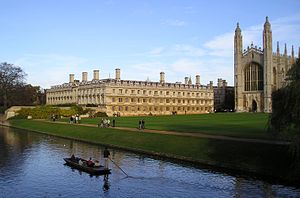|
Higher, post-secondary, or third level education refers to the level of education that is provided at academies, universities, colleges, seminaries, institutes of technology, and certain other collegiate-level institutions, such as vocational schools, trade schools, and career colleges, that award academic degrees or professional certifications. Since 1950, Article 2 of the first Protocol to the European Convention on Human Rights obligates all signatory parties to guarantee the right to education. At the world level, the United Nations International Covenant on Economic, Social and Cultural Rights of 1966, guarantees this right under its Article 13, which states that "higher education shall be made equally accessible to all, on the basis of capacity, by 
The University of Cambridge is an institute of higher learning in the United Kingdom Higher education is an educational level that follows the completion of a school providing a secondary education, such as a high school, secondary school, or gymnasium. Tertiary education is normally taken to include undergraduate and postgraduate education, as well as vocational education and training. Colleges, universities, and institutes of technology are the main institutions that provide tertiary education (sometimes known collectively as tertiary institutions). Examples of institutions that provide post-secondary education are vocational schools, community colleges, independent colleges (e.g. institutes of technology), and universities in the United States, the institutes of technical and further education in Australia, CEGEPs in Quebec, and the IEKs in Greece. They are sometimes known collectively as tertiary institutions. Completion of tertiary education generally results in the awarding of certificates, diplomas, or academic degrees, but the students who do not receive these (due to poor performance) outnumber those who do. High performance is expected of students in higher education, and those who cannot meet the standards must leave. Higher education includes teaching, research, exacting applied work (e.g. in medical schools and dental schools), and social services activities of universities. Within the realm of teaching, it includes both the undergraduate level (sometimes referred to as tertiary education), and beyond that, graduate-level (or postgraduate level) for qualified students who wish to go further in their education and skills. This level of education is often referred to as graduate school, especially in North America. In the United Kingdom and certain other counties (e.g. Ireland), post-secondary school education below the level of higher education is referred to as "further education". "Higher Education" in the U.K. generally involves work towards a college-degree-level or foundation degree education. In many developed countries, a high proportion of the population (up to 50%), now enter higher education at some time in their lives. Higher education is therefore very important to national economies, both as a significant industry in its own right and as a source of trained and educated personnel for the rest of the economy. There can be some disagreement about what precisely constitutes post-secondary, graduate-school, or tertiary education: "It is not always clear, though, what tertiary education includes. Is it only that which results in a formal qualification or might it include leisure classes? In the U.K., are A-levels tertiary education as they are post-compulsory, but taught in school settings, as well as colleges? Is professional updating or on-the-job training part of tertiary education, even if it does not follow successful completion of secondary education?" There are two types of higher education in the U.K.: higher academic education, and higher vocational education. Higher education in the United States and Canada specifically refers to post-secondary institutions that offer Associate’s degrees, Bachelor’s degrees, Master’s degrees, Education Specialist (Ed.S.) degrees or Doctor of Philosophy (Ph.D.) degrees, or their equivalents, and also higher professional degrees in areas such as medicine, dentistry, the law, optometry, etc. Such institutions may also offer non-degree certificates, which indicate completion of a set of courses comprising some body of knowledge, but the granting of such certificates is not the primary purpose of the institutions. Tertiary education is not a term used in reference to post-secondary institutions in the United States or Canada. Europe Main article: European Higher Education Area
See also
From Wikipedia, the free encyclopedia : University higher education |



